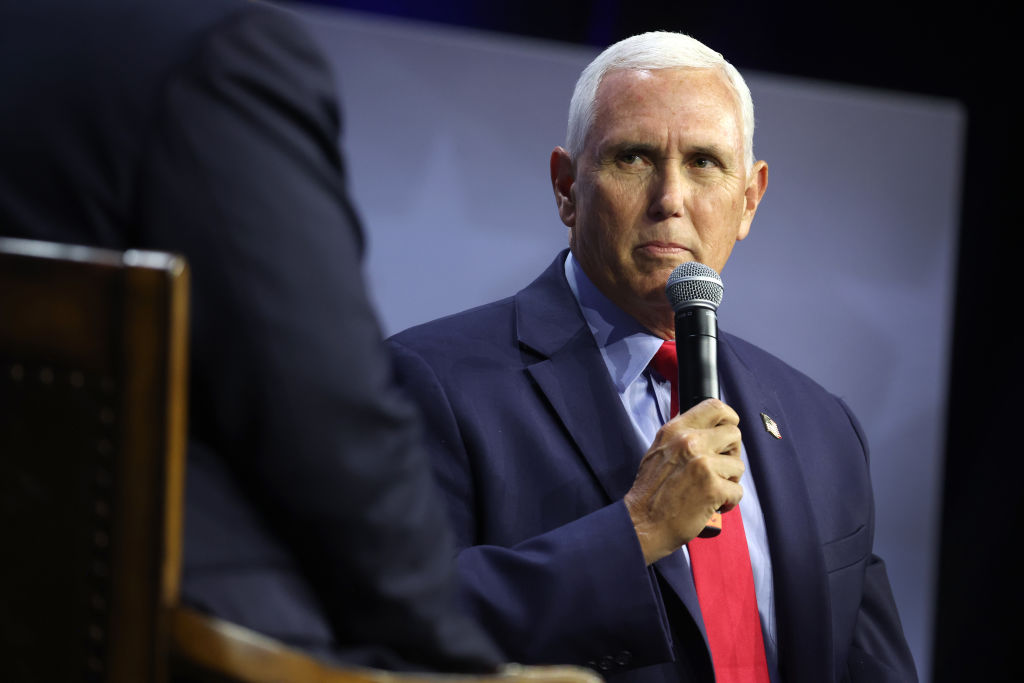Hello and happy Sunday. How’s your weekend going? As I was perusing some news sites for topic ideas, I saw something that surprised me less than it should have. The top headline at the Drudge Report proclaimed, “Record Heat Sweeps World.” And right below that? “Tourists Flock to Death Valley.” Sigh. Sounds about right.
The Guardian story about Death Valley notes that temperatures this weekend could exceed the modern record of 130 degrees Farenheit set in 2021 and notes, “The park’s extremes have long drawn in those attracted to extremes.” If only that phenomenon were confined to outdoor adventurists. Unfortunately it’s also a pretty accurate parable for our current political era.
Take a couple of stories from this week. A half-dozen of the declared GOP presidential candidates made their way to the Family Leadership Summit in Iowa, which bills itself as the “Midwest’s largest gathering of Christians seeking cultural transformation in the family, church, government.” But there wasn’t a lot of talk about abortion, family policy, religious liberty, or other topics that you’d assume were on the minds of Christian conservatives. Instead, moderator Tucker Carlson grilled the candidates on their stance on Ukraine, asked Asa Hutchinson how many COVID vaccinations he’d had, and asked Mike Pence–who had to be rushed to safety with his family on January 6—if he’d describe the events at the Capitol an insurrection. Pence demurred, calling it a riot, but still got a chilly reception from the crowd.
Carlson’s audience has shrunk since his firing by Fox News: His debut of his new “show” on Twitter got 26 million views, but viewership has declined by 86 percent since. And yet those who stay with him are loyal.
That loyalty was on display at the Family Leadership Summit. It’s hard to imagine, in a normal world, a candidate better aligned with Christian conservatives than Mike Pence. But, as the Washington Post notes, Pence’s mic-drop line about Ukraine—“A year and a half ago, Russia had the second most powerful military in the world. Today, they have the second most powerful military in Ukraine”—fell flat. The audience was there for Tucker Carlson, not Mike Pence.
As Dispatch writers and contributors have noted many times in response to different stories, such extremism distorts our discourse and our politics because those who hold extremist positions are in the minority (most Republicans still support assisting Ukraine, for example) but they are loud and insistent.
But it’s not just Republicans who are affected. It’s too early to know what kind of effect Robert F. Kennedy Jr. is going to have on the 2024 Democratic race, and his appeal is a bit of a mystery. But one could have written the same sentence about Donald Trump in June 2015 and … here we are.
RFK Jr. has long been known as an anti-vaxxer with a fondness for conspiracy theories, but it appears he kicked it up a notch at a recent press event in New York City. “COVID-19 attacks certain races disproportionately. COVID-19 is targeted to attack Caucasians and black people. The people who are most immune are Ashkenazi Jews and Chinese.” he said. He added, “We don’t know whether it was deliberately targeted” but the comments were part of a larger claim in which he alleged that the U.S. and China were both developing bioweapons. (The fact that these comments were reported a few days after another story from that press event described a shouting match between two guests that involved performative flatulence says something else about our state of affairs, but I don’t have the wherewithal to process that.)
While Kennedy is generally (and rightfully) described as a fringe candidate, the RealClearPolitics average that tracks polls for the Democratic nomination shows him at 14.4 percent.
It would be nice to think that eight years after someone opened up a Pandora’s box and Donald Trump popped out of it to ride down his golden elevator that we’d be in the mood for more boring, mild-mannered leaders who focused on policy and problem solving. And, truth be told, most of us probably are. But too often it feels like extremists are still carrying the day.
On that cheery note, here’s what you might have missed from the last week. Thanks for reading.
The two leading candidates for the GOP nomination are trying to cater to the populist MAGA base. Between them, Donald Trump and Ron DeSantis have the support of almost three-quarters of GOP voters in the RealClearPolitics polling average. What’s a challenger to do? Mike Pence is trying something that Michael Warren, reporting from Iowa, describes as “radical”: “He’s running as a movement conservative, a traditional Republican, and an experienced politician in a party whose recent history suggests little appetite for any of that. But the Pence campaign has challenged the conventional wisdom: What if the party isn’t really all that enthralled by Trump and Trumpism?” Michael senses enthusiasm for Pence from the voters he spoke to in Iowa, enough to make him think that Pence is “becoming the most interesting candidate” in the race.
Most of the big news out of the two-day NATO summit in Vilnius, Lithuania, this week had to do with a country that’s not even a member: Ukraine. Before the meetings even started, Turkish President Recep Tayyip Erdogan surprised everyone by dropping his opposition to Sweden’s accession to NATO. Sweden, of course, applied to join just months after Russia invaded Ukraine. Ukrainian President Volodymyr Zelenksy was in attendance, but was frustrated by the alliance’s refusal to set a timeline for his country’s admission. But there were a few encouraging signs for the beleaguered nation. As Charlotte reports, Turkey’s acquiescence to Sweden’s membership was just one of several signs that Erdogan, who has tried to walk a fine line on the war, is aligning more with the West for now. And Zelensky had a one-on-one meeting with Biden, after which he said, “We clearly see how to end this war with our common victory.”
Speaking of Ukraine, polling shows that Republicans still support assisting the nation. But the leading candidates for the GOP nomination—Trump and DeSantis of course, but also Vivek Ramaswamy, the biotech entrepreneur who’s been surging as of late—take “a dim view of helping European allies fend off a Russian invasion,” as Nick puts it in Boiling Frogs. He goes through each candidate’s particular stance on Ukraine, noting Trump’s total opposition and the more nuanced positions held by DeSantis and Ramaswamy, and tries to square that with how they are leading the polls even though Republicans generally support Ukraine. “Most primary voters don’t want a Bush/McCain/McConnell Republican even if they happen to believe we should be arming the Ukrainians against Russia,” he writes. “They want culture war.”
And here’s the best of the rest:
- In Capitolism, Scott Lincicome celebrates the Hulu show The Bear for being an accurate depiction of the restaurant industry—and not just in the kitchen. He discusses how well the show handles the regulatory challenges that restaurateurs face.
- Kevin uses the complaints about the Supreme Court’s decision on affirmative action and makes a case against consequentialism—the idea that judges and justices should take a law’s real-world effects into account when deciding cases. “Making legal decisions based on their likely practical effects ultimately means nothing more or less than that judges … do whatever seems right to them in the moment.”
- David Drucker interviewed Nikki Haley in New Hampshire, where she’s getting good reception from voters even as she struggles to gain traction nationally. “I fully expect us to stay where we are until midfall,” Haley tells him. “Then, by midfall, it’ll start to shake up after the debates, after things start to move and all that’s going to happen.”
- Hardline Republicans won a victory, albeit a fleeting one, by passing the National Defense Authorization Act—with an amendment to prohibit the military reimbursing travel expenses for service members who go out of state to get abortions and another one that eliminates the military’s diversity, equity, and inclusion programs. Those amendments mean that the bill is dead on arrival in the Senate. Harvest has the details in Uphill (🔒).
- If you’re not sure what to think about the Hunter Biden corruption allegations and the Department of Justice’s handling of them, you’re in good company. Jonah feels the same way and explains why in his Wednesday G-File (🔒).
- The pods: Sarah, Jonah, and Michael Warren take advantage of Steve’s absence to engage in some juvenile humor and disparage Spanish wine on the Dispatch Podcast. But they also discuss the decision to send cluster munitions to Ukraine and talk about the NATO summit. What’s up with the crime rate now that COVID is behind us? Jonah tries to find out in a conversation with RAND Corporation criminologist Shawn Bushway on The Remnant. And now that the Supreme Court term is over, David and Sarah catch up on some other big cases in other courts on Advisory Opinions.









Please note that we at The Dispatch hold ourselves, our work, and our commenters to a higher standard than other places on the internet. We welcome comments that foster genuine debate or discussion—including comments critical of us or our work—but responses that include ad hominem attacks on fellow Dispatch members or are intended to stoke fear and anger may be moderated.
You are currently using a limited time guest pass and do not have access to commenting. Consider subscribing to join the conversation.
With your membership, you only have the ability to comment on The Morning Dispatch articles. Consider upgrading to join the conversation everywhere.